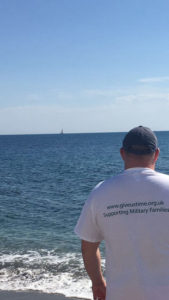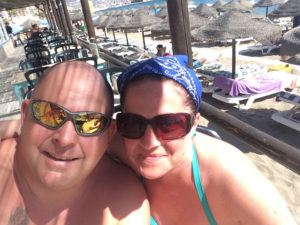Travelling with PTSD is not always easy for those struggling with their mental health and their partners. Scotty Darroch and his wife of 13 years Joanne, have given us their top tips: 5 from a veteran’s perspective and 5 tips on ‘how to best support your hubby!’
Scotty
 1. PLAN AHEAD: THE HIDDEN WOUND PASSPORT.
1. PLAN AHEAD: THE HIDDEN WOUND PASSPORT.
Apply for hidden wound passport or lanyard, this helps ease with security and staff are trained to help and assist you and give you a bit more time. You can look for more information on your airport special assistance page.
If traveling alone don’t be afraid to ask for assistance from the special assistance team or airport staff, crew.
2. BE COMFORTABLE.
If you can get extra seat leg room to stretch out and relax a little I would recommend it. Wear lose clothes that do not restrict you: whatever makes you comfortable.
3. SHUT THE NOISE OUT.
If you can, book into a lounge to avoid mass crowds and noise, pre-book up to day before travel for around 20% discount. Wear noise cancelling headphones ? to ease with noise and travel. If traveling on a propeller plane, headphones need to be connected with 3.5 mm jack cable, you cannot use Bluetooth on that type of aircraft.
3. CARRY WITH YOU:
- A Vick’s inhaler to help with sticky situations. You can use the inhaler to bring you back to the present time. Or carry a hanky with lavender spray on it to ease anxiety;
- Sometimes in stressful situations, incontinence can occur so take with you some spare underwear and some absorbent pads of sorts;
- Like most travellers, take roll on deodorant and wet wipes in hand luggage in case anxiety causes sweating.
5. MEDICATIONS.
Take enough medication for your trip away and carry in your hand luggage so you can access when needed. If traveling overseas take labelled medication boxes too, in case you need to see a doctor.
Joanne: Travelling with your partner and PTSD
1. BE AWARE OF THE TRIGGER POINTS.
For us and for Scotty it is sirens and lights from emergency vehicles so I always carry a Vicks inhaler in my pocket as it can help to ground him. When I see that a flashback is going to happen I act quickly and try to stop it by touching him and talking to him make him feel that I’m there just by holding his hand and reassure him that everything is going to be ok.
2. REASSURE.
I tend to check all our travel documents, passports tickets, etc as it takes the pressure of my hubby and when he knows we both have checked them it makes him feel reassured.
3. TAKE THE STRESS AWAY.
Always plan ahead and be aware of things that can make your partner anxious. For us it’s crowds, Scotty doesn’t like to be crowds and queues so I always where possible will book speedy boarding for flights or airport lounge so we can be away from the hustle and bustle of airports to make our journey more manageable.
Always give enough time to travel to the airport to avoid the added stress of being late.
4. BE THERE!!
Just being there for your partner reassures them that everything will be ok, that we are there together and everything will be ok.
5. MEDICATIONS.
One other major point of course is my hubby’s medication my goodness that’s the one thing I have to remember about every day!! Making sure he has taken his morning and night meds is my job and when we are travelling I double check everything before we leave home!
“I wish with all my heart that I could take Scotty’s PTSD away and let him have a normal life but unfortunately that will never be so I will continue to be there and support him forever he is my soul mate, my world and we will continue together and fight the daily life that having PTSD can bring.”
 David “Scotty” Darroch served for ten years as a Corporal and Training Instructor in the Army’s Royal Logistic Corps and has operational service in Northern Ireland, Bosnia and Kosovo.
David “Scotty” Darroch served for ten years as a Corporal and Training Instructor in the Army’s Royal Logistic Corps and has operational service in Northern Ireland, Bosnia and Kosovo.
Scotty had an extremely difficult period when leaving the Army. Not knowing he was suffering with a mental trauma he started self-medicating with alcohol and drugs and several attempts to take his life. It took 18 years to get a diagnosis of Major Depressive Disorder and PTSD. As part of his recovery process, he and his wife Joanne were offered a respite break through the charity “Give Us Time”. Thanks to donations of accommodation from hotels, cottages and private owners, the charity provides vital time away to military families, giving them the chance to rest, recover and reconnect in a neutral environment.
“Having the actual time to sit there with your loved one and go over the things that you have seen you can then focus on your future and it is vital to have that. Having had that time away with my wife I then had a refocus on my life and that’s what got me on to the sporting arena. It gave me the drive and confidence to apply for the Invictus Games 2016.”
Thanks to a generous donation of time, Scotty has turned his life around and is now also a motivational speaker, raising awareness on mental health.
Please visit the charity website to learn more: www.giveustime.org.uk





